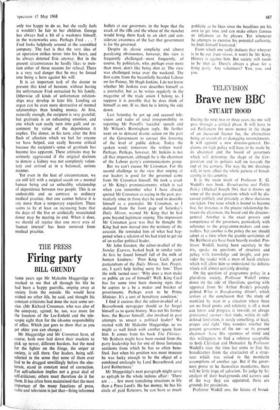Firing party
THE PRESS BILL GRUNDY
Some years ago Mr Malcolm Muggeridge re- marked to me that all through his life he had been a happy guerrilla, sniping away at society from the outside. He would have wished no other life, he said, and thought his constant criticisms had done the state some ser- vice. (Mr Richard Crossman, who was also of the company, agreed; he, too, was more for the freedom of the Lee-Enfield and the tele- scopic sight than for the irksome responsibility of office. Which just goes to show that as you get older you can change.) Mr Muggeridge and Mr Crossman have, of course, both now laid down their muskets to pick up newer, different burdens, but the need for the fighter on the fringe, the sniper at society, is still there. Our leaders, being self- selected in the sense that none of them ever had to be dragged unwillingly before the elec- torate, stand in constant need of correction. For self-selection implies not a great deal of self-criticism; others must therefore do it for them. It has often been maintained that the most important of the many functions of press, radio and television is just that—firing informed bullets at our governors, in the hope that the crack of the rifle and the wheee of the ricochet would bring them back to an alert and con- siderate awareness of the fact that government is for the governed.
Despite its classic simplicity and almost paralysing obviousness, however, this view is frequently challenged—most frequently, of course, by politicians, who, perhaps even more than most, don't like being shot at. The view was challenged twice over the weekend. The first came from the beautifully bearded Labour MP for Putney, Mr Hugh Jenkins. I do not know whether Mr Jenkins ever describes himself as a journalist, but as he writes regularly in the magazine of the trade union I belong to, I suppose it is possible that he does think of himself as one. if so, then he is letting the side down.
Last Saturday he got up and accused tele- vision and radio of total irresponsibility in reporting Mr Powell's 'racialist' speech and Mr Wilson's Birmingham reply. He further went on to demand drastic action on the part of the Government to correct this lowering of the level of public debate. Today the spoken word; tomorrow the written word. Perhaps. Perhaps, however, Mr Jenkins is not all that important, although he is the chairman of the Labour party's communications group.
But we can't excuse Mr Crossman. For the second challenge to the view that sniping at our leaders is good for the governed came from Mr Crossman himself. He took a crack at Mr King's pronunciamento; which is sad when you remember what I have already quoted Mr Crossman as saying in the past, par- ticularly since in those days he used to describe himself as a journalist. Mr Crossman, so I deduced from the front page of Saturday's Daily Mirror, warned Mr King that he had gone beyond legitimate sniping. The impression Mr Crossman gave was that he thought Mr King had now moved into the territory of the assassin. He reminded him of what had hap- pened when a relation of his had tried to get rid of an earlier political leader.
Mr John Gordon, the editor-in-chief of the Sunday Express, harked back in similar vein. At first he found himself full of the milk of human kindness: 'Poor King Cecil, grand panjandrum of the Daily Mirror, Sun, People, etc, I can't help feeling sorry for him.' Then the milk turned sour: `Why does a man make so public an ass of himself? Well, King Cecil has for some time been showing signs that he aspires to a be a maker and breaker of governments. Perhaps even to be Prime Minister. It's a sort of hereditary condition.'
I find it curious that the editor-in-chief of a Beaverbrook newspaper should so far forget himself as to quote history. Was not his former boss, the Beaver himself, also involved in past attempts to unseat a political leader? We started with Mr Malcolm Muggeridge, so we might as well finish with another quote from him. It comes from his book The Thirties: `Mr Baldwin might have been ousted from the party leadership but for one of those fortunate accidents from which he has so often bene- fited. Just when his position was most insecure he was lucky enough to be the object of a combined onslaught by Lord Beaverbrook and Lord Rothermere.'
Mr Muggeridge's next paragraph might serve as epitaph to the whole tedious affair: 'There are . . . few more tantalising situations in life than a Press Lord's. He has money, he has his circle of paid flatterers; he can have as much publicity as he likes since the headlines are his own to get into, and can make others famous or infamous as he pleases. Yet whenever he attempts to exercise his potential authority, he finds himself frustrated.'
From which one sadly deduces that whoever is to be our franc-tireur, it won't be Mr King. History is against him. But society still needs to be shot at. There's always a place for a firing party. Any volunteers? You, you, and you.






































 Previous page
Previous page